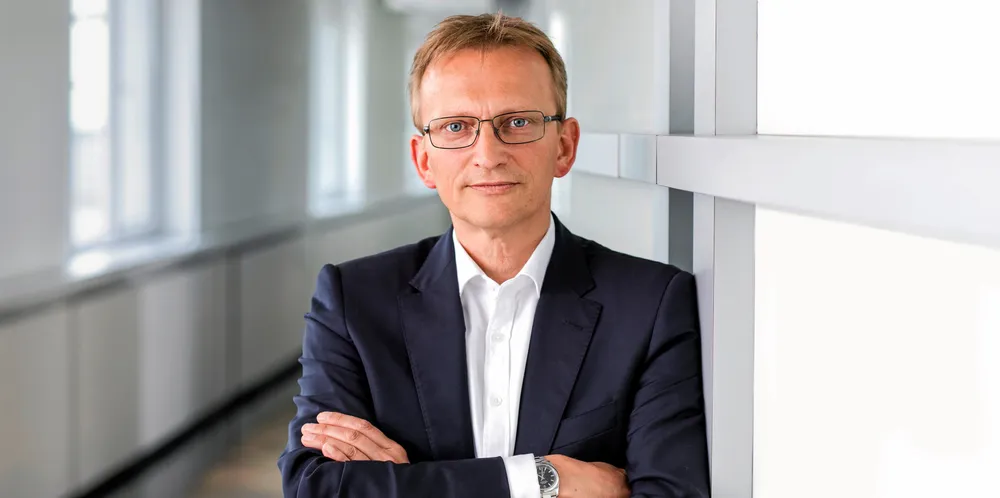'What is a European turbine?' Wind's supply chain weighs competing priorities
Employment and living standards also factors in the debate on supply chain resilience, conference told

The European conversation about resilient wind power supply chains and reducing dependence on Asia needs to include questions of social and environmental standards, and of what consumers are willing to pay, said leading players in the sector.
Taking part in a discussion on levels of European dependence on Asia that ranged from to processing and component manufacturing, Andreas Evertz, CEO of industrial gearbox manufacturer Flender, told the recent WindEurope conference in Bilbao that some honest thinking is required.
“Maybe we need to start talking about what we are willing to pay for products. The debate about the competitiveness of local supply chains can also relate to the quality of living we want, to what we are prepared to pay and to the working conditions required,” he said.
“I think we will need a global supply chain, but within our capabilities of doing things locally. And that's why we have to balance it out in the right way.”
The EU’s Net Zero Industry Act (NZIA) announced by the European Commission last year, aims to ensure that manufacturing capacity for strategic net-zero technologies approaches at least 40% of annual deployment needs by 2030. Much of the concern about how to achieve that has focussed on the trade implications of overcapacity in China, and issues such as commercial and social dumping.
What is European?
But Evertz suggested that it was important to not to overreach with limitations.
“You could start with asking what is the European gearbox? Or what is a European turbine? We still have the capacity to produce and assemble the components here, but there has been a big shift from about 25 years ago when it was 100% European supply right down to raw material and cast iron,” he said.
“Today our company’s biggest plants are in China and the supply chain is totally different, with the biggest part of the raw materials coming out of Asia.
“It starts with resources, also the flexibilities of workers, working hours, salary costs, electricity cost, all these kind of things.”
Circularity
Securing a level playing field in terms of social and environmental standards also impact the circularity objectives that form part of Europe’s industrial policy, according to Petra Inghelbrecht, senior sustainability leader with US company Owens Corning Fiberglass
“For us as glass producers, reducing dependency on Asia has nothing to do with raw materials. We have ample access to raw materials like sand and dolomite. It is all about fair competition and level playing fields,” she said.
Inghelbrecht added that circularity presents some” huge opportunities” for a company that is already investing in new technologies for remelting glass fibres.
“Circularity is all about taking back the waste from the value chain.. and turning it back into real valuable high level, high quality products for the markets,” she said.
Retaining scrap
The same logic was applied to green steel, but Stephane Tondo, head of climate change and governmental affairs at ArcelorMittal, said more must be done to ensure that scrap metal stays in Europe, giving the example of ships that typically head for beaches in Pakistan for breaking up, with low social and environmental standards.
“If the authorities do their part to make sure that the demand for green steel is there, then everyone can invest in the change to produce greener products more sustainable, but at the end, if other countries do not exactly play by the same rules, we may lose the game," he said.
Tondo criticised EU policy makers for excluding steel from the terms of the Critical Raw Materials Act, and he gave the examples of germanium and gallium as elements that were discovered in Europe but production has moved away.
“Do we need to wait until industries such as aluminum move away to recognise that they're also critical, because that's the situation today? We need to make sure that these products are also considered as strategic for Europe's development for Europe's economy, and that we have industrial policies that make sure that we keep them," he said.
Tondo also addressed issues of sourcing. "Wind turbine producers say we have to preserve the supply chain and they want rules for a resilient supply chain, but they want to be free to buy towers wherever [they] want. Tower manufacturers say they want rules to make sure supply chain resilient, but they want to be free in where they source their raw materials," he said.
"But we are at the beginning of the chain, the raw materials.... and we are also the largest consumer of electricity. So if we move from Europe, a big part of the growth that has been foreseen for capacity increase in Europe will vanish. So I think either we're a complete supply chain or not.
"I don't think it's hopeless, if the EU's non-price criteria is put in place, but I think we have to look at the supply chain over the whole supply chain for the net zero act to work."
(Copyright)